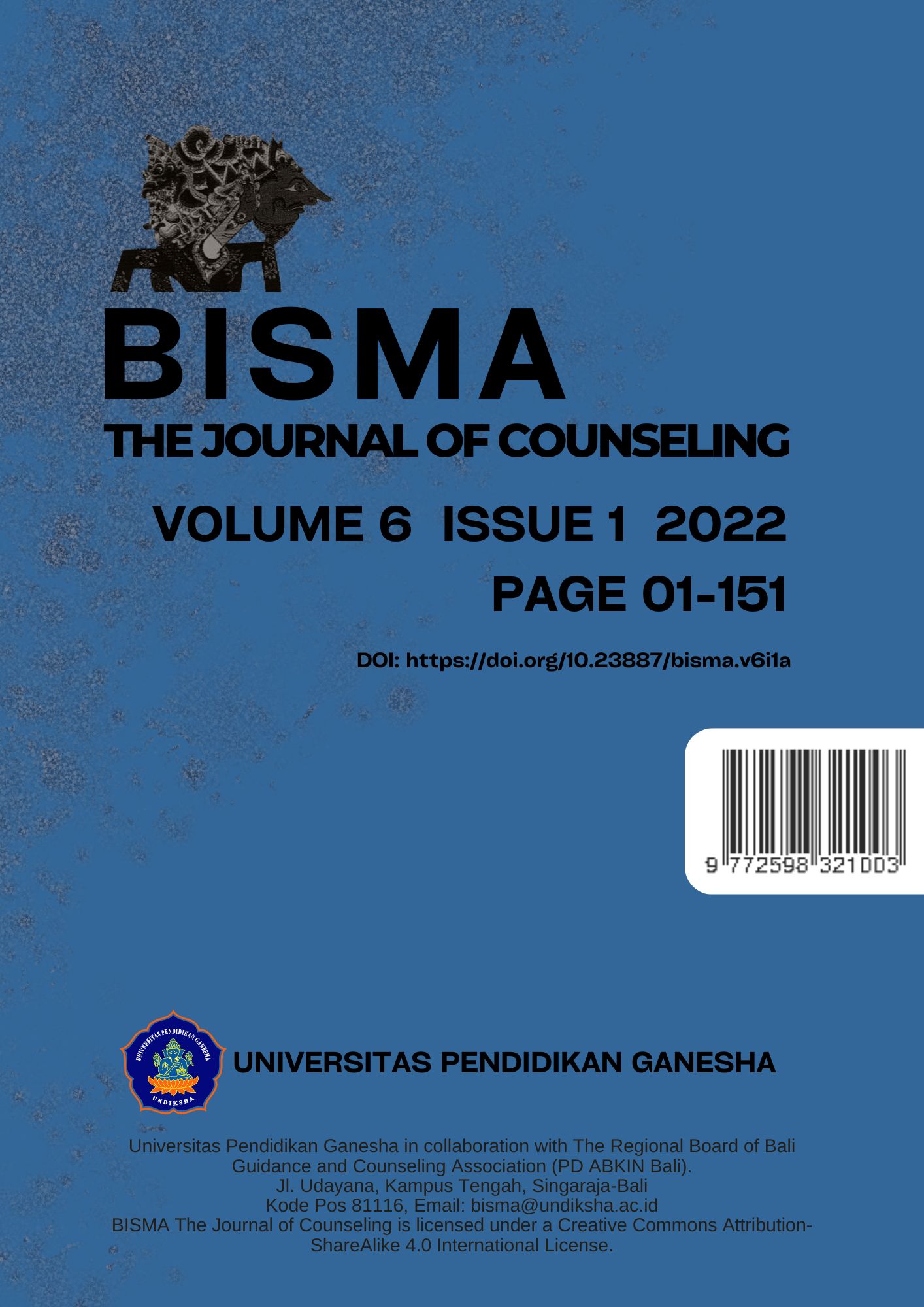The Intensity of Use of Social Networking Applications on Self-confidence
DOI:
https://doi.org/10.23887/bisma.v6i1.48970Keywords:
self-confidence, social networking, studentAbstract
This study was intended to determine the effect of the intensity of using the Tik Tok application with self-confidence in students at the State University of Semarang. This research uses correlational quantitative method. The sampling technique used is simple random sampling with a population of 1170 people, the number of samples is 265 people. The data analysis technique used a simple linear regression test. The results of this study indicate that there is a significant positive effect of the intensity of using the tik tok application on self-confidence. Based on the results of this study, it is recommended that lecturers hold activities by utilizing social media such as Tik Tok, Instagram, Facebook and others which are currently being used by students. As a student, self-confidence is needed both in terms of lectures and in terms of society. So it can be concluded that the intensity of using the tik tok application greatly affects the self-confidence of FIP UNNES students, so if the intensity of using the tik tok application on students is high, the confidence in students will be high as well.
References
Adawiyah, D. P. R. (2020). Pengaruh Penggunaan Aplikasi TikTok Terhadap Kepercayaan Diri Remaja di Kabupaten Sampang. Jurnal Komunikasi, 14(2), 135–148. https://doi.org/10.21107/ilkom.v14i2.7504
Aji, W. N. (2018). Aplikasi Tiktok Sebagai Media Pembelajaran Bahasa dan Sastra Indonesia. Prosiding Seminar Nasional Pertemuan Ilmiah Bahasa Dan Sastra Indonesia, 431.
Ardari, C. (2018). Pengaruh Kepercayaan Diri Terhadap Intensitas Penggunaan Media Sosial Pada Remaja Awal. Applied Microbiology and Biotechnology, 85(1).
Asimidou, A., Lenakakis, A., & Tsiaras, A. (2021). The contribution of drama pedagogy in developing adolescents’ self-confidence: a case study. NJ, 45(1), 45-58.
Bramandita, S. (2020a). Optimasi Tik Tok.
Burnette, C. B., Kwitowski, M. A., & Mazzeo, S. E. (2017). “I don’t need people to tell me I’m pretty on social media:” A qualitative study of social media and body image in early adolescent girls. Body Image, 23, 114–125. https://doi.org/10.1016/J.BODYIM.2017.09.001
Deni, A. U., & Ifdil. (2016). Konsep Kepercayaan Diri Remaja Putri. Jurnal Education, Jurnal Pendidikan Indonesia, 2(2).
Desmita. (2017). “Developmental Psychology”, Psikologi Perkembangan. In Rineka Cipta.
Fauziah, Y. R. (2019). Konsep Diri Remaja Pengguna Aplikasi Tik Tok di Kota Bandung. Jurnal Ilmu Komunikasi, 112.
Firth, J., Torous, J., Stubbs, B., Firth, J. A., Steiner, G. Z., Smith, L., ... & Sarris, J. (2019). The “online brain”: how the Internet may be changing our cognition. World Psychiatry, 18(2), 119-129.
Gleason, B., & Von Gillern, S. (2018). Digital citizenship with social media: Participatory practices of teaching and learning in secondary education. Journal of Educational Technology & Society, 21(1), 200-212.
Gopinath, R. (2020). Study on Relationship between Emotional Intelligence and Self Actualization among Academicians of Tamil Nadu Universities.
Hardiansyah. (2018). Indonesia Sumbang Angka Unduhan TikTok Terbanyak di Dunia. https://tekno.kompas.com/read/2020/09/11/15010037/indonesia-sumbang-angka-unduhan-tiktok-terbanyak-di-dunia
Harlig, A., Abidin, C., Boffone, T., Bowker, K., Eloi, C., Krayenbuhl, P., & Oh, C. (2021). TikTok and short-form screendance before and after Covid. The International Journal of Screendance, 12.
Herlisya, D., & Wiratno, P. (2022). Having Good Speaking English through Tik Tok Application. Journal Corner of Education, Linguistics, and Literature, 1(3), 191-198.
Kartini, S. (2019). krisis percaya diri dan solusinya. CV.aneka ilmu.
Khattab, M. (2019). Synching and Performing : Body ( Re ) - Presentation in the Short Video App TikTok. WiderScreen, 21(21).
Maghfirah, F., Andriani, F., & Mirzal, H. (2021). Social Media as a Medium of Da’wah: Religious Transformation among Online Da’wah Audience on TikTok Platform. LENTERA.
Marini, R. (2019). Pengaruh Media Sosial Tik Tok Terhadap Prestasi Belajar Peserta Didik di SMPN 1 Gunung Sugih Kabupaten Lampung Tengah. Universitas Islam Negeri Raden Intang Lampung.
McQuail, D. (2011). Teori Komunikasi Massa, Suatu Pengantar. In Jakarta: Erlangga.
Nirmalasari, V., & Liliani, E. (2022). The Use of Instagram as A Media for Indonesian Learning Assignments. International Journal of Linguistics, Literature and Translation, 5(1), 122-129.
Nufus, R., Maharani, W., & Zahro, E. B. (2022, January). Capture The Psychological Image Of Youth Using Tiktok Applications. In International Conference Of Humanities And Social Science (ICHSS) (Vol. 1, No. 1, pp. 547-551).
Oliveira, T., Araujo, B., & Tam, C. (2020). Why do people share their travel experiences on social media?. Tourism Management, 78, 104041.
Rao, S. K., & Prasad, R. (2018). Impact of 5G technologies on industry 4.0. Wireless personal communications, 100(1), 145-159.
Rasadi, D. (2017). Tingkat Kepercayaan Diri Mahasiswa Berprestasi Belajar Rendah (Studi Deskriptif pada Mahasiswa Program Studi Bimbingan dan Konseling Universitas Sanata Dharma Yogyakarta Tahun.
Sabekti, R. (2019). Hubungan Intensitas Penggunaan Media Sosial (Jejaring Sosial) Dengan Kecenderungan Narsisme Dan Aktualisasi Diri Remaja Akhir. In Skripsi.
Salo, A. (2019). The Power of Dance: How Dance Effects Mental and Emotional Health and Self-Confidence in Young Adults.
Sample, M. C. (2021). The Impact of Social Media on Adolescent Female Relationships (Doctoral dissertation, Morgan State University).
Sari, D. M. (2021). “Penggunaan Aplikasi Tik Tok Sebagai Ajang Eksistensi Diri (Fenomenologi Penggunaan Tik Tok Pada Mahasiswa UIN Shultan Thaha Saifuddin Jambi).”
Sugiyono, P. D. (2016). metode penelitian kuantitatif, kualitatif,dan R&D. In Alfabeta, cv.
Tama, M. (2020). Kisah Kejayaan TikTok di 2020. CNN Indonesia. https://www.cnnindonesia.com/teknologi/20201210145006-185-580569/kisah-kejayaan-tiktok-di-2020/1
Upadhyay, D., Talwar, S., Tiwari, S., & Gujral, H. (2020). Self-Confidence A Demeanor To Emotional Intelligence. Proteus Journal, 11(11), 120-134.
West, R., & Turner, L. H. (2017). Pengantar teori komunikasi analisis dan aplikasi. In Journal of Chemical Information and Modeling (Vol. 53, Issue 9).
Wulandari, E., & Wijaya, S. H. B. 2018. Utilization of the Tiktok Video Application as a Means of Showing Existence And Self-Disclosure of Teenagers on Social Media.
Downloads
Published
Issue
Section
License
Copyright (c) 2022 Dewi Yuliana

This work is licensed under a Creative Commons Attribution 4.0 International License.









